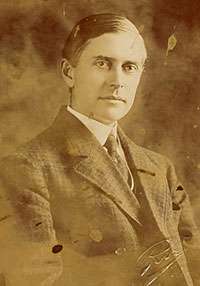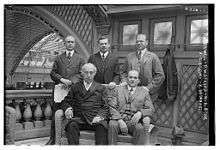Arthur Farwell


Arthur Farwell (March 23, 1872 – January 20, 1952) was an American composer, conductor, educationalist, lithographer, esoteric savant, and music publisher.
Biography
Farwell was born in St Paul, Minnesota. He trained as an engineer at Massachusetts Institute of Technology, graduating in 1893, but was turned towards a musical career by contact with the eccentric Boston-based composer Rudolf Gott. After studying in Boston, he became a pupil of Engelbert Humperdinck in Berlin and Alexandre Guilmant in Paris. Returning to the U.S., he lectured in music at Cornell University from 1899 to 1901, and founded the Wa-Wan Press, dedicated to publishing the works of the American Indianist composers, among whom Farwell himself was a leading figure. From 1910 to 1913 Farwell directed municipal concerts in New York City, including massed performances of choral works, some of them his own, by up to 1,000 voices. He directed the Music School Settlement (Now Third Street Music School Settlement) in NY from 1915-18 where his private pupils included the young Roy Harris. During this period he provided the score for Percy MacKaye's "Community Masque" Caliban by the Yellow Sands.[1] In 1918 he moved to California, assuming the role of Acting Head of the music department at the University of California, Berkeley in 1918-19, he founded the Santa Barbara Community Chorus, was first holder of the composer's fellowship of the Music & Art Association of Pasadena (1921–25), taught theory at Michigan State College (1927–39) and eventually settled in New York. Nicolas Slonimsky noted in Baker's Biographical Dictionary that "Disillusioned about commercial opportunities for American music, including his own, he established in East Lansing, in April 1936, his own lithographic handpress, with which he printed his own music, handling the entire process of reproduction, including the cover designs, by himself."
His notable students include Bernard Rogers.
Music and writings
Farwell wrote a copious amount of instrumental, chamber, choral and orchestral music as well as theatre scores, masques and music for community performance. Some of his works reflect his interest in a personal, esoteric form of spirituality, which is also displayed in his lectures and writings on the theme of Intuition. Among his principal compositions are a number of Symbolistic Studies for orchestra, a Symphony developed from a fragmentary opening left by his mentor Rudolph Gott, the large-scale "symphonic song ceremony" Mountain Song for orchestra and chorus, a string quartet, a piano quintet and many works both vocal and instrumental on the music of Native American peoples. A gradual but ceaseless developer as a composer, in his last couple of decades Farwell produced his most individual works - including a series of polytonal studies for piano, several concise instrumental sonatas, a large number of effective and penetrating settings of the poetry of Emily Dickinson and a satirical opera, Cartoon, which contains extended parodies of Stravinsky and Schoenberg.
In 1992, Evelyn Davis Culbertson (1915-2006), a professor-emeriti at Oral Roberts University in Tulsa, Oklahoma, published the documentary work, He Heard America Singing: Arthur Farwell, Composer and Crusading Music Educator, based on thirty years of research.[2]
References
- ↑ Mackaye, Percy (1916). Caliban by the Yellow Sands. New York: Doubleday Page & Co. p. 153.
- ↑ He Heard America Singing: Arthur Farwell, Composer and Crusading Music Educator. Scarecrow Press. 1992. pp. 885 total. ISBN 978-0810825802. Retrieved March 17, 2015.
External links
- Free scores by Arthur Farwell at the International Music Score Library Project
- To Morfydd, for oboe and piano. From Sibley Music Library Digital Scores Collection